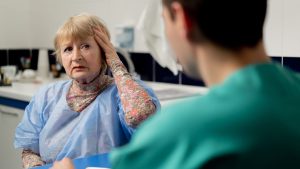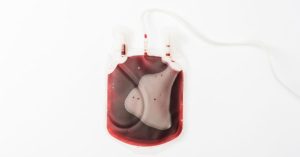
Lyme disease can present with a broad range of symptoms. Many of them are familiar to clinicians. But in some cases, a patient may exhibit atypical symptoms, including rashes other than the well-known “bull’s eye” rash. These unique presentations of Lyme disease can make diagnosing the illness particularly difficult.
For instance, Sharma reports, “Our case did not exhibit typical target lesions.” Instead, the patient had a “large erythematous, warm, rash without central clearing over the left lower quadrant, with similar but smaller rashes on abdomen and back and scattered white patches on surface and side of tongue.”
Three weeks prior, the man had been on a camping trip, after which he developed headaches, fever, malaise, fatigue, generalized weakness and generalized joints, muscle and back pain, writes Sharma in the British Medical Journal. [1] Ibuprofen alleviated his symptoms but only briefly.
Additional symptoms developed including “chills, shaking, alternating with cold feeling and warm, profuse sweating, retching, blurry vision, stomach pain, leg cramps, and chest pressure. Headache was generalized without neck rigidity or photophobia,” writes Sharma.
Doctors suspected oral pseudomembrane was due to HIV or mono. But these conditions were later ruled out. They also suspected that methicillin-resistant Staphylococcus aureus skin infections were causing the atypical rashes. And so, he was prescribed Vancomycin.
The man was positive for Epstein-Barr virus (mononucleosis). But the initial ELISA test for Lyme disease was negative. Tests should not be used, however, for diagnosing Lyme disease, as they are typically unreliable. Lyme disease is a clinical diagnosis.
The patient was empirically started on doxycycline for Lyme disease. And his symptoms quickly improved.
Eventually, Western blot test results came back positive and the patient was diagnosed with early disseminated Lyme disease.
At his 4-week follow-up visit, the man’s rash and symptoms had completely resolved.
The author reminds doctors that Lyme disease can cause unusual presentations. “Lyme disease can have unrelated findings like oral pseudomembrane, lymphadenopathy that may lead one to suspect alternative diagnoses like acute HIV or infectious mononucleosis.”
Related Articles:
Atypical symptoms of Lyme disease: numbness, paresthesias and abdominal wall weakness
Atypical case: Bannwarth syndrome and weight loss
Don’t be mislead: patients can have both mono and Lyme disease
References:
- Sharma U. Disseminated Lyme disease presenting as multiple non-target cellulitic-appearing skin lesions and oral pseudomembrane. BMJ Case Rep. 2018;2018.



Been suffering joint pain, headaches, brain fog, and tired for over a year now. Bitten by a tick that was attached for about 30 hours, bulls eye rash that lasted for 10 days. Tested for Lyme with the first test positive, and two weeks later they tell me it’s negative. Heart started skipping, went to cardiologist, sent me to an EP. Went to ENT doctor, ct sinus not it , sent me to a neurologist, did mri,blood work, lumbar puncture . Said came back positive for ehrlichia, sent me to an infectious disease md, did blood work can’t find anything . Throughout the course of the year I have been treated several times with Doxycycline and I do improve but once off a month or so latter the symptoms return .
I find it a good sign that you have improved for a short time. You may have to consider other regimens including other treatments. Call my office at 914 666 4665 if you have any questions.